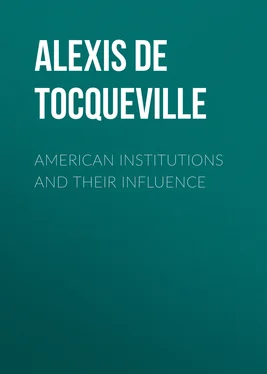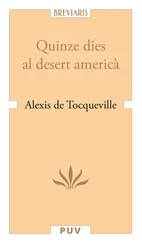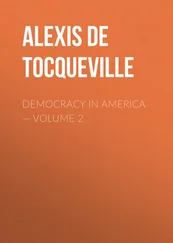Alexis de Tocqueville - American Institutions and Their Influence
Здесь есть возможность читать онлайн «Alexis de Tocqueville - American Institutions and Their Influence» — ознакомительный отрывок электронной книги совершенно бесплатно, а после прочтения отрывка купить полную версию. В некоторых случаях можно слушать аудио, скачать через торрент в формате fb2 и присутствует краткое содержание. Жанр: foreign_antique, Политика, foreign_edu, на английском языке. Описание произведения, (предисловие) а так же отзывы посетителей доступны на портале библиотеки ЛибКат.
- Название:American Institutions and Their Influence
- Автор:
- Жанр:
- Год:неизвестен
- ISBN:нет данных
- Рейтинг книги:5 / 5. Голосов: 1
-
Избранное:Добавить в избранное
- Отзывы:
-
Ваша оценка:
- 100
- 1
- 2
- 3
- 4
- 5
American Institutions and Their Influence: краткое содержание, описание и аннотация
Предлагаем к чтению аннотацию, описание, краткое содержание или предисловие (зависит от того, что написал сам автор книги «American Institutions and Their Influence»). Если вы не нашли необходимую информацию о книге — напишите в комментариях, мы постараемся отыскать её.
American Institutions and Their Influence — читать онлайн ознакомительный отрывок
Ниже представлен текст книги, разбитый по страницам. Система сохранения места последней прочитанной страницы, позволяет с удобством читать онлайн бесплатно книгу «American Institutions and Their Influence», без необходимости каждый раз заново искать на чём Вы остановились. Поставьте закладку, и сможете в любой момент перейти на страницу, на которой закончили чтение.
Интервал:
Закладка:
Among these documents we shall notice as especially characteristic, the code of laws promulgated by the little state of Connecticut in 1650. 29 29 Code of 1650, p. 28. Hartford, 1830.
The legislators of Connecticut 30 30 See also in Hutchinson's History, vol. i., pp. 435, 456, the analysis of the penal code adopted in 1648, by the colony of Massachusetts: this code is drawn up on the same principles as that of Connecticut.
begin with the penal laws, and, strange to say, they borrow their provisions from the text of holy writ.
"Whoever shall worship any other God than the Lord," says the preamble of the code, "shall surely be put to death." This is followed by ten or twelve enactments of the same kind, copied verbatim from the books of Exodus, Leviticus, and Deuteronomy. Blasphemy, sorcery, adultery, 31 31 Adultery was also punished with death by the law of Massachusetts; and Hutchinson, vol. i., p. 441, says that several persons actually suffered for this crime. He quotes a curious anecdote on this subject, which occurred in the year 1663. A married woman had had criminal intercourse with a young man; her husband died, and she married the lover. Several years had elapsed, when the public began to suspect the previous intercourse of this couple; they were thrown into prison, put upon trial, and very narrowly escaped capital punishment.
and rape were punished with death; an outrage offered by a son to his parents, was to be expiated by the same penalty. The legislation of a rude and half-civilized people was thus transferred to an enlightened and moral community. The consequence was, that the punishment of death was never more frequently prescribed by the statute, and never more rarely enforced toward the guilty.
The chief care of the legislators, in this body of penal laws, was the maintenance of orderly conduct and good morals in the community: they constantly invaded the domain of conscience, and there was scarcely a sin which they did not subject to magisterial censure. The reader is aware of the rigor with which these laws punished rape and adultery; intercourse between unmarried persons was likewise severely repressed. The judge was empowered to inflict a pecuniary penalty, a whipping, or marriage, 32 32 Code of 1650, p. 48. It seems sometimes to have happened that the judge superadded these punishments to each other, as is seen in a sentence pronounced in 1643 (New Haven Antiquities, p. 114), by which Margaret Bedford, convicted of loose conduct, was condemned to be whipped, and afterward to marry Nicolas Jemmings her accomplice.
on the misdemeanants; and if the records of the old courts of New Haven may be believed, prosecutions of this kind were not infrequent. We find a sentence bearing date the first of May, 1660, inflicting a fine and a reprimand on a young woman who was accused of using improper language, and of allowing herself to be kissed. 33 33 New Haven Antiquities, p. 104. See also Hutchinson's History for several causes equally extraordinary.
The code of 1650 abounds in preventive measures. It punishes idleness and drunkenness with severity. 34 34 Code of 1650, pp. 50, 57.
Innkeepers are forbidden to furnish more than a certain quantity of liquor to each customer; and simple lying, whenever it may be injurious, 35 35 Ibid, p. 64.
is checked by a fine or a flogging. In other places, the legislator, entirely forgetting the great principles of religious toleration which he had himself upheld in Europe, renders attendance on divine service compulsory, 36 36 Ibid, p. 44.
and goes so far as to visit with severe punishment, 37 37 This was not peculiar to Connecticut. See for instance the law which, on the 13th of September, 1644, banished the ana-baptists from the state of Massachusetts. (Historical Collection of State Papers, vol. i., p. 538.) See also the law against the quakers, passed on the 14th of October, 1656. "Whereas," says the preamble, "an accursed race of heretics called quakers has sprung up," &c. The clauses of the statute inflict a heavy fine on all captains of ships who should import quakers into the country. The quakers who may be found there shall be whipped and imprisoned with hard labor. Those members of the sect who should defend their opinions shall be first fined, then imprisoned, and finally driven out of the province. (Historical Collection of State Papers, vol. i., p. 630.)
and even with death, the Christians who chose to worship God according to a ritual differing from his own. 38 38 By the penal law of Massachusetts, any catholic priest who should set foot in the colony after having been once driven out of it, was liable to capital punishment.
Sometimes indeed, the zeal of his enactments induces him to descend to the most frivolous particulars: thus a law is to be found in the same code which prohibits the use of tobacco. 39 39 Code of 1650, p. 96.
It must not be forgotten that these fantastical and vexatious laws were not imposed by authority, but that they were freely voted by all the persons interested, and that the manners of the community were even more austere and more puritanical than the laws. In 1649 a solemn association was formed in Boston to check the worldly luxury of long hair. 40 40 New England's Memorial, p. 316. See Appendix E.
These errors are no doubt discreditable to the human reason; they attest the inferiority of our nature, which is incapable of laying firm hold upon what is true and just, and is often reduced to the alternative of two excesses. In strict connection with this penal legislation, which bears such striking marks of a narrow sectarian spirit, and of those religious passions which had been warmed by persecution, and were still fermenting among the people, a body of political laws is to be found, which, though written two hundred years ago, is still ahead of the liberties of our age.
The general principles which are the groundwork of modern constitutions—principles which were imperfectly known in Europe, and not completely triumphant even in Great Britain, in the seventeenth century—were all recognised and determined by the laws of New England: the intervention of the people in public affairs, the free voting of taxes, the responsibility of authorities, personal liberty, and trial by jury, were all positively established without discussion.
From these fruitful principles, consequences have been derived and applications have been made such as no nation in Europe has yet ventured to attempt.
In Connecticut the electoral body consisted, from its origin, of the whole number of citizens; and this is readily to be understood, 41 41 Constitution of 1638, p. 17.
when we recollect that this people enjoyed an almost perfect equality of fortune, and a still greater uniformity of capacity. 42 42 In 1641 the general assembly of Rhode Island unanimously declared that the government of the state was a democracy, and that the power was vested in the body of free citizens, who alone had the right to make the laws and to watch their execution. Code of 1650, p. 70.
In Connecticut, at this period, all the executive functionaries were elected, including the governor of the state. 43 43 Pitkin's History, p. 47.
The citizens above the age of sixteen were obliged to bear arms; they formed a national militia, which appointed its own officers, and was to hold itself at all times in readiness to march for the defence of the country. 44 44 Constitution of 1638, p. 12.
In the laws of Connecticut, as well as in those of New England, we find the germe and gradual development of that township independence, which is the life and mainspring of American liberty at the present day. The political existence of the majority of the nations of Europe commenced in the superior ranks of society, and was gradually and always imperfectly communicated to the different members of the social body. In America, on the other hand, it may be said that the township was organized before the county, the county before the state, the state before the Union.
Читать дальшеИнтервал:
Закладка:
Похожие книги на «American Institutions and Their Influence»
Представляем Вашему вниманию похожие книги на «American Institutions and Their Influence» списком для выбора. Мы отобрали схожую по названию и смыслу литературу в надежде предоставить читателям больше вариантов отыскать новые, интересные, ещё непрочитанные произведения.
Обсуждение, отзывы о книге «American Institutions and Their Influence» и просто собственные мнения читателей. Оставьте ваши комментарии, напишите, что Вы думаете о произведении, его смысле или главных героях. Укажите что конкретно понравилось, а что нет, и почему Вы так считаете.












